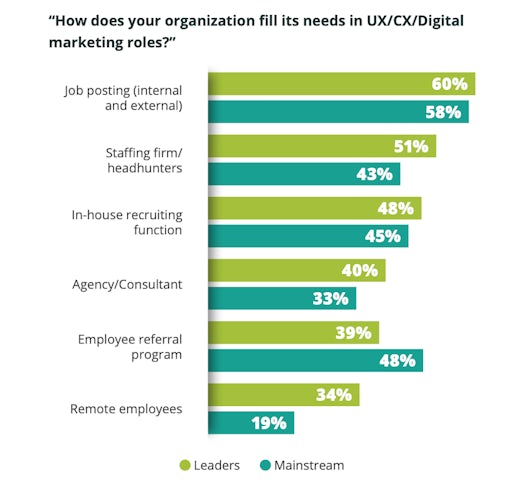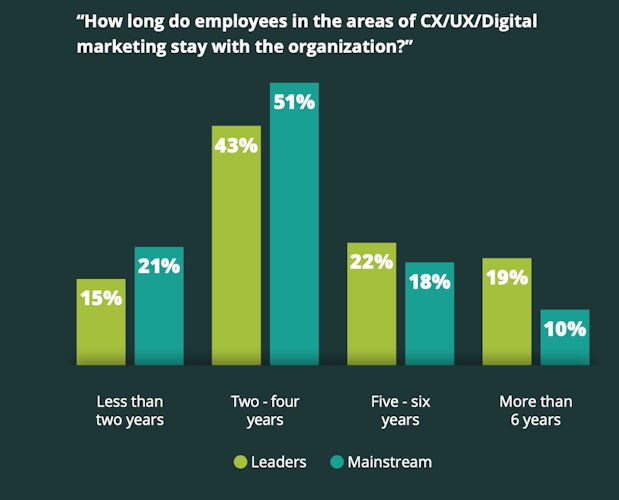In fact, according to Econsultancy’s ‘The Cheat Code to Growth’ report in partnership with Vitamin T, CX roles are the most strategically important for growth.
You can download a copy of the report here.
Here are some of the key findings…
CX talent is the key to growth
Leaders recognise that recruiting the right talent is key to growth. In the Q1 survey of 322 executives with hiring oversight and/or visibility into hiring strategy, 95% of leading organisations cited CX job roles as important to achieving business growth, followed closely by UX (87%) and brand marketing (85%). In comparison, digital marketing was only highlighted by 61% of leaders.
Overall, 87% of senior managers reported that ‘recruiting the right digital talent is a critical challenge.’
Leaders take a nimble recruiting approach
One of the main reasons for this difficulty in recruiting is budget, with 58% of leading organisations saying that it is ‘challenging to meet compensation levels of the competition’. Finding the right balance of experience levels is also tough, particularly when it comes to finding individuals to lead teams or to integrate varied CX technologies.
With delays also an issue – positions tend to stay open for two to three months on average – businesses are increasingly looking to third-parties for acquisition, with 51% of leaders now using staffing firms to help find talent.
Surprisingly, only 34% of leaders and 19% of mainstream businesses used remote employees prior to the coronavirus outbreak to fill CX/digital marketing roles. The pandemic is likely to change this attitude going forward, however, with businesses reporting the same level of productivity from remote employees.

Positive company culture helps to retain talent for longer
While both mainstream and leading organisations find hiring talent difficult, there is a difference in the hard and soft skills they prioritise. For example, leaders are three times more likely than the mainstream to devote digital talent to strategic rather than tactical tasks (62% vs. 20%).
What’s more, leaders are more likely to be oriented toward advancing transformation goals, such as cyber security to protect valuable customer data (37% leaders vs 29% mainstream), while the mainstream is more focused on analytics and data science. (25% leaders vs 29% mainstream).
Regardless of this, both mainstream and leading organisations recognise the importance of fostering a positive company culture – particularly when the average duration for a role (in the areas of CX/UX/digital marketing) is just two to four years.

Organisations that display positive company culture tend to retain employees for much longer in high growth roles, (said to be an average of six years) compared to organisations lacking cultural attributes.
In future, particularly post-Covid-19, opportunities such as remote working and job flexibility are likely to be all the more important when it comes to retaining talent.

Comments